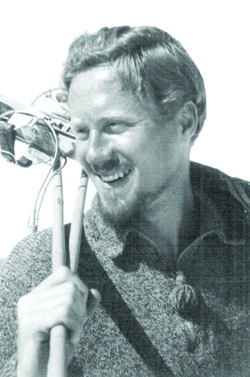 |
Regarding his eccentricity, a well-known incident on the 1953 expedition regards a heavy crate of Pugh's 'physiological equipment'. The Sherpas carefully manoeuvred the crate up the treacherous Khumbu Icefall, only to find later that it contained bottle after bottle of mango chutney! No surprise then that Pugh, back in London, would often forget where he had parked his car. He would then report to the police that his car had been stolen, following which it would be eventually recovered.
Pugh may have been odd, but no one questioned his brilliance. In the spring of 1952, the Swiss team of Raymond Lambert and Tenzing Norgay (the same Tenzing who would later summit with Hillary) were only 300m from the top of Everest. Amazingly, they abandoned their attempt!
Griffith Pugh, using field studies in May 1952 in the Cho Oyu area, determined that there were two important reasons for the failure of the physically strong Swiss team. Pugh concluded that dehydration due to excessive deep breathing (hyperventilation) could be severe at extreme altitudes if not replenished by generous quantities of fluids. Incredibly the Swiss team in 1952 forgot to pack a stove in their ultimate bid for Everest and were melting snow with candles for drinking water. Pugh, in an extensive report to the Royal Geographical Society, emphasised the importance of plentiful fluids for a successful climb. Indeed, as a result Hillary and Tenzing were drinking 'mugs of lemonade' as they ascended.
Pugh also concluded that the second reason why the Swiss team failed was that the supplemental oxygen apparatus in those days allowed climbers to breathe oxygen only while resting. So he designed a device that enabled climbers to inhale oxygen even while on the move.
Climbing experts agree that there is little doubt that the Swiss team, born and bred in the mountains and possessing a technical climbing ability superior to that of the British, failed in the spring of 1952 primarily because of insufficient attention to oxygen and hydration. Eccentric Griffith Pugh cleverly determined why they had failed and was thus key to putting the British team on top the very next year.


